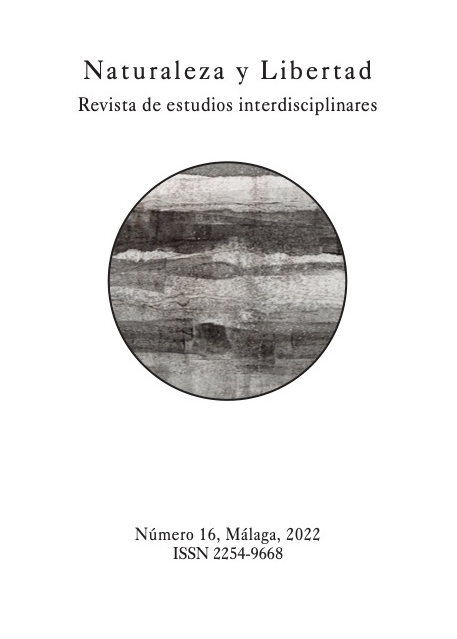The garbage-recycling dichotomy as a resignification of subjectivity for the new century
DOI:
https://doi.org/10.24310/NATyLIB.2022.vi16.12926Keywords:
Philosophy of garbage, Jacinto Choza, Artificial Intelligence, subjectivity, recyclingAbstract
This note analyzes the proposal for the conceptualization of human natural subjectivity raised in Jacinto Choza's book Philosophy of Garbage. The global, technological and legal responsibility towards contemporary subjects that raise problems, such are the redefinitions of the human in Queer currents such as the cyborg or post-human subjectivities. It is proposed through the inclusive natural subjectivity of concepts such as recycling and garbage, the differentiation of the moral subject from the economic subject, as well as the amoral subject from the AI ??by not enjoying, as the author says, its own natural subjectivity.
Downloads
Metrics
References
Barona, S., 2019. Inteligencia Artificial o algoritmización de la vida y de la justicia: ¿solución o problema?. Revista Boliviana de Derecho, Issue 28, pp. 18-49.
Bauman, Z., 2013. Vigilancia líquida. Barcelona: Editorial Espasa .
Bently, L. & Sherman, B., 2014. Intellectual Property Law. Oxford: Oxford University Press.
Bercovitz Rodríguez-Cano, R., 1992. Comentario a la sentencia del Tribunal Supremo, de 26 de octubre de 1992. Cuaderno Cívitas de Jurisprudencia Civil, Issue 30, pp. 959-970.
Boza, P. & Evgeniou, T., 2021. Implementing AI Principles: Frameworks, Processes and Tools. INSEAD Review, Issue 4, pp. 1-32.
Braidotti, R., 2020. El conocimiento posthumano. Barcelona: Editorial Gedisa.
Braidotti, R., 20215. Lo Posthumano. Barcelona: Gedisa Editorial.
Braun, D. E. H. & Tomasz, y., 2021. Regulating Artificial Intelligence. Binary Ethics and Law. New York: Routledge.
Choza, J., 2020. Filosofía de la basura. La responsabilidad global, tecnológica y jurídica. Sevilla: Editorial Thémata.
Copeland, J., 1993. Cap. 9 "are we computers?". En: Artificial Intelligence: Philosophical Introduction. New Jersey: Wiley-Blackwell, pp. 180-204.
Diéguez, A., 2017. Transhumanismo. La búsqueda tecnológica del mejoramiento humano. Barcelona: Herder Editorial.
Diéguez, A., 2021. Cuerpos inadecuados. Barcelona: Herder Editorial.
Fazio, A., 2019. Fundamentos conceptuales de la propiedad intelectual. Liberalismo y críticas. Ideas y valores, 68(170), pp. 121-145.
Ginsburg, J. & Budiardjo, L. A., 2019. Authors and Machines. Berkeley Technology Law Journal, Volumen 34, pp. 414-418.
Haraway, D., 2020. Manifiesto Cíborg. 2ª ed. Madrid: Kaótica Libros.
Lee, E., 2012. Digital originality. Vanderbilt J. of Ent. and Tech. Law, 14(4), pp. 919-957.
López de Mántaras, R., 2017. La inteligencia artificial y las artes. Hacia una creatividad computacional. En: El próximo paso: la vida exponencial. Madrid: BBVA, pp. 99-123.
Molina, J. M., 2008. La formación del concepto de derecho de autor y la originalidad de su objeto. En: El derecho de autor y las nuevas tecnologías: Reflexiones sobre la reciente reforma de la Ley de Propiedad Intelectual. Madrid: La Ley, pp. 295-314.
MORALES A., 2021. El impacto de la Inteligencia Artificial en el Derecho. Advocatus, Issue 39, pp. 39-71.
Muñoz, J. E., 2020. Utopía Queer. El entonces y allí de la futuridad antinormativa. Buenos Aires: Caja Negra Editora.
Peinado Gracia, J. I., 2018. Lección 11. La propiedad intelectual: derechos de autor y derechos afines. En: Lecciones de Derecho Mercantil. Volumen I. Navarra: Thomson Reuters-Civitas, pp. 211-236.
Pirela, M. A., 2020. Protección jurídica de los productos de la inteligencia artificial en el sistema de propiedad intelectual. Revista Jurídica Austral, 1(1), pp. 319-342.
Porcelli, A. M., 2020. La inteligencia artificial y la robótica: sus dilemas sociales, éticos y jurídicos. Derecho Global. Estudios sobre Derecho y Justicia, 6(16), pp. 49-105.
Ríos Ruiz, W. R., 2001. Los sistemas de inteligencia artificial y la propiedad intelectual de las obras creadas, producidas o generadas mediante ordenador. La Propiedad inmaterial, Issue 3, pp. 5-13.
Sadin, É., 2020. La Inteligencia Artificial o el desafío del siglo. Anatomía de un antihumanismo radical. Buenos Aires: Caja Negra Editora.
Tao, H. B., Pérez, V. D. & Guerra, Y., 2020. Subjetividades e Inteligencia Artificial. Veritas, pp. 81-107.
Vásquez Leal, L., 2020. ¿Autoría algorítmica? Consideraciones sobre la autoría de las obras generadas por inteligencia artificial. Revista Iberoamericana de la Propiedad Intelectual, Issue 13, pp. 207-233.
Yanisky-Ravid, S., 2017. Generating Rembrandt: Artificial Intelligence, Copyright, and Accountability in the 3ª Era: The Human-like Authors Are Already Here: A New Model. Mich, St. L. Rev. 659, Issue 4, pp. 659-726.
Downloads
Published
How to Cite
Issue
Section
License
Those authors who have publications with this journal, accept the following terms:
1. Copyright and licensing information are clearly described on the journal’s web site: all content published in Naturaleza y Libertad is open acces without limit, and are subject to the Attribution-NonCommercial-ShareAlike 4.0 International (CC BY-NC-SA 4.0) license. The full text of which can be consulted at https://creativecommons.org/licenses/by-nc-sa/4.0/
2. It is the responsibility of the authors to obtain the necessary permissions for the images that are subject to copyright. The authors whose contributions are accepted for publication in this journal will retain the non-exclusive right to use their contributions for academic, research and educational purposes, including self-archiving or deposit in open access repositories of any kind. The electronic edition of this magazine is edited by the Editorial de la University of Malaga (UmaEditorial), being necessary to cite the origin in any partial or total reproduction.
3. This journal allows and encourages authors to publish papers on their personal websites or in institutional repositories, both before and after their publication in this journal, as long as they provide bibliographic information that accredits, if applicable, your posting on it.
4. In no case will anonymous papers be published.





18.png)













